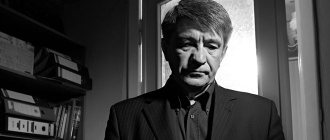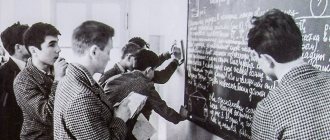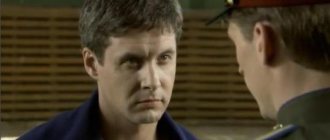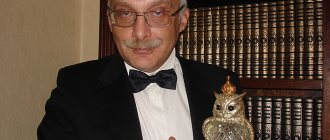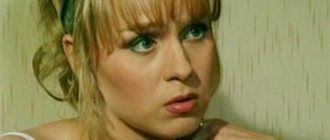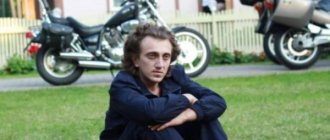Childhood and youth
Alexander Alexandrovich Zhigalkin was born on February 1, 1968 in Moscow. The actor’s creative biography began in 1983, when the teenager appeared as a ninth-grader in the film-play directed by Yuri Krotenko “The Weather in the City is Good.” He received his professional education in Yuri Ashvarov's group at the acting department of the Boris Shchukin Higher Theater School, from which he graduated in 1992.
Alexander Zhigalkin in his youth
As a student, he played not only in educational productions at the Yevgeny Vakhtangov Theater, but also voiced the French cartoon “Pif and Hercules” in 1982 for distribution in the Soviet Union. Together with classmates Eduard Radzyukevich and Viktor Bakin, the graduate organizes the “Scientific Monkey” theater, which is especially successful in comedy productions.
Movies
In the 90s, the young actor starred a lot in small roles. Almost simultaneously, Pyotr Todorovsky’s film “Anchor, More Anchor!”, which has collected a collection of film awards, Vsevolod Shilovsky’s action-packed detective story “Code of Dishonor” and Vladislav Chebotarev’s musical film “The Italian Contract” are being released. Zhigalkin voices the videos shown on the popular television program “Your Own Director.”
Alexander Zhigalkin in the film “Anchor, more anchor!”
After such a program, it is simply necessary to really become a director. His first directorial work was the sketch show “Dear Transfer,” which was released in 2004 on the Ren-TV channel. In 2005, the entire project team switched to “STS”, where the program became known as “6 frames”. In 2011, for his work on this show, Alexander Zhigalkin received the TEFI award in the “Director of a television program” category.
Alexander Zhigalkin and Fyodor Dobronravov in the series “Exchange Brothers”
Director Zhigalkin’s filmography includes mainly comedy series, the most popular of which are “Voronin” and “Daddy’s Daughters.” Less well known are the adventures of the role-switching twins in Exchange Brothers. In these films, director Zhigalkin can also be seen as an actor. In "Daddy's Daughters" he plays San Sanych, director of Radio Active. Almost the entire “6 Frames” team filmed with him.
Alexander Zhigalkin in the series "Daddy's Daughters"
In “The Voronins,” the character Zhigalkin is called more respectfully - he is Alexander Alexandrovich, Kostya’s new boss. For the first ten seasons, the series was a Russian adaptation of an American sitcom, but from season 11 the television family began to live its own life. The series has been published since 2009, and all this time Alexander Zhigalkin remains the main director of the adventures of a large and cheerful family.
Alexander Zhigalkin on the set of the series “Voronin”
In 2020, after the 455th episode of “The Voronins” was filmed, lasting 25 minutes, the film crew received a diploma stating that the result of their work was included in the Guinness Book of Records as the longest adapted television project in world television. Arbiter of the Guinness Book of Records Richard Stenning specially came to the set and presented Alexander Zhigalkin with a certificate confirming this achievement.
Career
In the 90s, the actor did not play many roles, but these were iconic, resonant projects of wonderful directors:
- “Anchor, more anchor!”;
- "Code of Dishonor";
- "Italian contract".
Alexander was at the origins of the creation and dubbing of the once very popular program “Your Own Director”.
His most notable roles in the 2000s were played in the TV series “Turkish March”, “Exchange Brothers”, “Daddy’s Daughters”, “Voronins”.
Alexander Zhigalkin and Fedor Dobronravov. Still from the series “Exchange Brothers”
As a director, he is known primarily for the projects “6 Frames”, “Voronins”, “Daddy’s Daughters”.
At the theater, Zhigalkin staged the plays “A Winter Night’s Dream” and “Schweik or a Hymn to Idiocy.” As a theater actor, he collaborated with the Satire Theater, Variety Theater and Quartet I.
Interesting: Alexander Dyachenko: ex-wife and daughter who never existed
As a TV presenter and TV director, he took part in the projects “Television cocktail for three”, “Thank God you came!” and others.
Personal life
Alexander chose his colleagues as his wife three times. The actor entered into his first marriage with Daria Poverennova while still a third-year student at the Shchukin Theater School. Daria studied there, but one year younger. The couple lived together for 10 years, but divorced. In her first marriage, on August 15, 1992, a daughter, Polina, was born. She chose the profession of journalist, graduated from the Faculty of Journalism of Moscow State University and works in a large PR agency.
Alexander Zhigalkin with his daughters
In his second marriage to producer Ekaterina Zhigalkina, a daughter, Anastasia, was born in 2001. Nastya studies at the Moscow Lyceum, graduated from music school and is thinking about an acting career. The third wife of Alexander Zhigalkin was also a graduate of the Shchukin School, Svetlana Antonova. By the time they met, both future spouses were single. Svetlana raised her daughter Maria, born in 2004.
Alexander Zhigalkin and his wife Svetlana Antonova
Six-year-old Masha, according to her mother, put a decisive end to a long period of courtship by inviting Alexander to stay with them. In the third marriage, a daughter, Taisiya, was born in 2012, and a son, Arseny, was born on April 8, 2016. The couple solemnly celebrated their wedding only in 2013, when Taisiya was one year old. The father of the family built a country house, where everyone happily goes for the summer from noisy Moscow.
Alexander Zhigalkin with his family
Photos on Instagram eloquently tell about Alexander’s personal life. On the microblog you can see all four charming daughters together, a baby enthusiastically playing with her dad, and many other warm moments from the life of the family. The main thing is not to confuse photographs from real life and from the film sets of TV series. The director’s experience in raising children came in handy when working with the young actresses of Daddy’s Daughters.
Alexander Zhigalkin now
In 2020, Alexander Alexandrovich celebrated his 50th anniversary. I celebrated modestly: I sat with my family and friends in the restaurant of the Central House of Actors and accepted congratulations from my colleagues. The anniversary attracted the attention of journalists, who asked the hero of the day about his personal life and creative plans. Zhigalkin said that he is still full of strength, new ideas and is constantly busy in new and old projects.
In 2020, comedy fans will see Zhigalkin’s new directorial work - a television series about the life of Russian mafiosi “Force Majeure”. As in the adventures of the brothers, who switched roles, viewers will see an intelligent, quiet doctor, forced by fate to play the role of a “thief in law.” It is planned to make full-length films based on the popular TV series “Voronin” and “Daddy’s Daughters”. The premiere of the full-length "Daddy's Daughters" is planned for 2018.
Filmography of the actor
- 1983 — “The weather is good in the city”
- 1992 - “Anchor, more anchor!”
- 1993 — “Code of Dishonor”
- 1993 - “Italian contract”
- 1996 - “Return of the Battleship”
- 1998 — “Retro Threesome”
- 2001 — “Turetsky’s March”
- 2001 — “The Lion’s Share”
- 2005 — “Dear Transfer”
- 2006 - “Who’s the boss?”
- 2006-2014 - “6 frames”
- 2009 — “Daddy’s Daughters”
- 2010 — “Garages”
- 2013 — “Exchange Brothers”
- 2015 — “Voronins”
Alexander Zhigalkin: “I’ve been doing what I love all my life!”
I would like to start the interview by quoting you. In one of your interviews, you said: “...I go to work as if it’s a holiday...” At the moment, given such a colossal busyness, can you say the same?
Yes, sure! All my life I go to work as if it were a holiday, because all my life I have been doing what I love.
Is lack of time the norm for you now?
Unfortunately, I have been on a tight schedule for several years now and rarely have free time, which I always value very much.
As a graduate of the old acting school, and now a teacher, I would like to ask you to assess the level of professionalism of modern young actors and graduates of theater universities.
In general, I am not inclined to give assessments because critics give assessments, this is their job. But our level of criticism is quite low; for example, I don’t know a single good critic. The most ungrateful thing in the world, in my opinion, is to become a critic. I cannot give an assessment; it seems to me that the level of theater education, like the level of education in general, has become lower on average. But, I think that at the Moscow Art Theater School-Studio now everything is at a good level, but the Shchukin School has some problems. Even judging by the skits that we held not so long ago. It was an initiation into actors, a traditional evening that we organize at the House of Actors. This evening is a dedication for last year's graduates, during which they are accepted into the Moscow acting family, and the graduates of each institute show their skit. That year, the graduating class from the Shchukin School was rather weak.
Don’t you think that most young actors are counting on media exposure and only want to get on television, and are not talking about working in the theater?
This is wrong. A lot of young actors work in theaters. Even among the young artists I know, whom I photograph with pleasure, and these are graduates of the last 5-7 years, many work in theaters. Of course, they want to work on television and in series - today this is their income. This is, if you can call it that, “easy money”, because the requirements, unfortunately, are not the highest, since I work in this area, in this business, I know this first-hand. Which is of course very sad. And some want the opportunity to get into some kind of “soap” and, without straining themselves professionally, but only by spending a certain amount of time, get a good financial profit. If you get a role in a series of 30-40 episodes, then you are provided with work and finances for a year, and then, suddenly, some of these people become so-called “stars”. Of course, it is a great blessing that now there is a galaxy of young and middle-aged artists whom the new generation can look up to, both in the acting profession and in directing, among other things. But there are very few real professionals these days. It’s difficult for me to judge the theater because my last work experience was at the Satire Theater, which was quite a long time ago, but I think the same thing happens in the theater.
I talk to a lot of young actors and they all say that it is impossible to get a good role in a good theater without playing a significant role in cinema and vice versa...
I don't entirely agree with this. It seems to me that there is no specific recipe and everything is very individual. Maybe, in part, they are right, but they are probably based on the experience of two or three individuals who managed to achieve something using a similar scheme. When you start taking someone else’s experience as a starting point, you make a very big mistake, because the starting point should only be your own experience. You need to go your own way and there is no definite pattern in this, it all depends on what the circumstances will be, and chance, which in our profession can play a very big role in life.
Is there any luck?
You know, I’ll tell you this, there can be no luck without daily, exhausting and exhausting work.
You have now completed a project on the Rossiya TV channel, and is your work continuing with the STS TV channel?
Of course, most of my work takes place on the STS TV channel. And I work on this channel, which is headed by Vyacheslav Murugov. The man thanks to whom my career in television began, since it was with him that I began my first project as a director. This was back on REN TV, where Slava was a producer and the project was called “Faculty of Humor”. Afterwards, “Dear Program” appeared, which, after undergoing a slight rebranding, was reborn in the “6 Frames” project on the STS TV channel. And now most of the projects I do are aired on the STS TV channel. But there are exceptions: for example, a couple of years ago Denis Evstigneev and I did a project for Channel One and, more recently, another project was held on the Russia TV channel with great success - “Exchange Brothers”, with the participation of Fyodor Dobronravov.
There is a phrase: “Educate while entertaining.” Since you work in the entertainment genre, I would like to know if you are trying to educate your viewer?
I have a goal to give people kindness and warmth, and, in my opinion, general education channels should educate. I believe that when a person laughs, he is in any case enlightened and thinks: “If I enjoy life, then I am alive!”, from which it follows that he is enlightened and lives with emotions. Perhaps there is some enlightenment in this. Of course, the projects that I have done and am doing are mostly family-based and they bring a certain amount of education: children will learn some things for themselves, adults will be able to highlight many points related to behavioral norms. But basically, these projects are designed to make people laugh and take their mind off the problems of everyday life. After all, plots, quite often, model life. Often, we show situations in which viewers can see fragments of their lives or the lives of their relatives, friends, neighbors, so some projects have existed for a very long time: “Voronins” has been on the air for 4 years, and “6 Frames” have had high ratings for 10 years years. Because most situations are similar, people see themselves in them and they like to look at themselves. If a person, after watching one of the projects I filmed, finds himself in a similar situation after some time and realizes that this is not the right thing to do, then perhaps this is enlightenment.
To paraphrase Karl Marx, I really like this statement, I will note: “Humanity, laughing, parts with its past!”
Do you collaborate with screenwriters?
When we receive a “6 frames” script, we can edit something on the set, but usually everything is fine there. For a big work like Exchange Brothers, I often edited the script because not all the moments, in my opinion, were stylistically accurate, in terms of the character's characteristics, for example, what words they can say and what they can't. This happens. In general, Tarkovsky wrote “... if the director does not participate in writing the script, then the cinema will not be a director’s art,” because cinema is a director’s art, although now it is increasingly becoming a producer’s art. If a director is not the author of his film, then such a director is worthless. Of course, I get involved in the work of the screenwriters, of course, I correct and edit the scripts. Another important factor is how the artist will appear in front of the viewer; responsibility for this lies entirely with the director, although the screenwriter is a very important part of the film.
When working on projects, does your opinion, as a director, always coincide with the opinion of the channel’s management?
We always create some new projects together and think and discuss for a very long time. Discussing the project, we are already one team. We cannot have fundamental disagreements, but disputes arise in the creative process; this is probably an integral part of the joint work of creative people. Sometimes there are moments of misunderstanding, as was the case with the “Two Fathers, Two Sons” project. Now this project is airing on the STS TV channel with the participation of Dmitry Nagiyev, and in the pilot episode we filmed Fedor and Viktor Dobronravov, but it turned out that the channel wanted to air a sitcom, and our version of the pilot episode was in the style of a lyrical comedy. The project was put on the shelf and work on it began within a few years. Now this is a highly rated mix of a sitcom and a romantic comedy, with other artists.
As for the rating of your projects...
On television, and even more so on a commercial channel, which is the STS channel, ratings play a major role, because everything depends on advertising. If you made a project that did not receive enough audience attention and sympathy, then next time the channel management will think very carefully whether to give you something or not?
Very serious work is being done on these ratings. There are special focus groups, but sometimes they miss the mark. Sometimes your own feelings as a director are at odds with the feelings and reactions of the viewer, and the day after the premiere of the project you can expect anything.
You often take part in your projects as an actor...
I am haunted by the glory of the brilliant Eldar Aleksandrovich Ryazanov, we know each other and I endlessly appreciate and respect him. I have a book that he signed for me with great tenderness. I am happy that I have the opportunity to know him. Naturally, we are not close friends, but I am grateful to fate that I can communicate with such a person as Eldar Aleksandrovich. He played small roles in all his films. I also like to occasionally appear in my films, playing the same small roles. As for “6 frames”, it is often a necessity, it happens that one of the artists is absent, and, plus, I still have an acting education and at times I just want to do something myself.
Now in which role are you more comfortable: actor or director?
I feel more comfortable being a director now. I don’t think that I’m a mediocre artist, I know how to play and I do it with pleasure. I have several acting victories behind me, mostly in the theater; I haven’t played anything great in cinema, but I enjoyed starring in small episodes for great directors such as G.I. Poloka, P.E. Todorovsky. But I’m not interested in doing one thing, in a creative sense - I have a very polygamous nature. I need a lot of different things! I write, I try to produce, I started directing, although while studying at the institute, I couldn’t even imagine that I would be a director. For me it was like a bad dream! In such creative tasks, I always resorted to the help of my friend Eduard Radzyukevich, and he helped me. But later, I became interested and started directing. Well, then it just happened by itself.
I have been doing step dance for many years and have reached certain peaks. For example, in Hannover in 1993, I danced at the station, and afterwards adults came up to me and said that they were seeing a real, live step dancer for the first time. Subsequently, I took this number to the birthday of one of the most famous saxophonists in Germany. It was a pure coincidence, his son was walking down the street and, seeing me, asked me to perform a dance for his father, who had an anniversary that day, as a gift. So, together with my friend Marat Aleev, who performed jazz on the accordion, I danced a step dance at this celebration.
Then I wanted to do an act with enemas and worked on it for a very long time. In 2002, Ivan Zamotaev and I presented this act in Edinburgh at the street performers festival, where, according to BBC Scotland, we became the best, winning the SMS vote. They played on air and competed with other participants. No one in Russia needs this, but this is some kind of internal, next step for me. When this stage is reached, you can move on and achieve success in something else.
Now I have one performance, which I am playing with the group “Quartet I”. I go on stage once a month, which, of course, is not enough, but I don’t feel any urgent need for it, because now I have a very eventful and work-filled life, and I don’t experience a lack of such things as self-realization. I periodically appear in skits - out of thirst for sensations, but this is more of a tradition. Cabbage is quite a complex genre, and Edik Radzyukevich and I have occupied the niche of cabbage masters since our student years. From time to time you want to take some direction and prove to yourself that you are the best. But I will never sing professionally, although I sing and can sometimes even go on stage with Ivan Zamotaev. I think that singing should still be left to professionals.
In addition to the fact that you are an actor and director, you are also one of the directors of the House of Actors. Yablochkina. Probably the most pressing issue is the issue of financing; I would like to talk about people who work for a small salary, and about solving this problem.
It hurts me to talk about people who work here for a small salary because today I pay them these salaries. This is our joint pain with Igor Zolotovitsky, my colleague, but today we cannot give more because the budget is limited. We are an absolutely self-sustaining organization, we are a public regional fund for helping theater workers. All we earn is from rent. Boris Yeltsin gave this building to the House of Actors for a long-term lease, we have an agreement with the city for 49 years and there are premises here that we sublease. We spend everything we receive from sublease on employee salaries, on the maintenance of this century-old building, on creative and charitable activities. At the same time, every day we think about how we can find sponsors. We search and find. A club of patrons of the arts has recently appeared in the House of Actors, which has already held its first meeting.
Thanks to our patrons, we made renovations on the first floor of the building. Now it’s time for the stage. And the creation of a working project requires a lot of expense. Now we have already found part of the funds. We are sponsored by people who care about the fate of the House because we want to turn it into a cultural and creative center with different opportunities, especially since this house has an incredible history. There is every opportunity to organize projects for young people and veterans, and to develop cultural life. We have a huge international activity, very famous people come to us and sometimes it’s just a shame to bring them to a small room. Foreign artists give their lectures to young actors in the small and dusty “Blue Living Room”, and when a new stage appears, then, accordingly, our capabilities will increase, and such events will be held at a different level.
Still, there is a solution to this problem?
Of course, some of the funds have already been found.
What about government assistance?
We do not have a state budget. But today's sponsors support us very much.
In your opinion, the state should not deal with such problems?
In my opinion, it should. But the theaters that are supported by the state also have plenty of problems. I believe that organizations like ours can exist at the expense of patrons and people who do charity work.
Do large numbers of people always come to concerts at the House of Actors?
This place is iconic, so we have no problems with visitors. Now we have made some of the events paid, we invite our “star” friends for a very small fee and they give the opportunity to come and receive an exclusive product. This is not a theater where a person waits for the artist at the service entrance after the performance to get an autograph. By coming to us, the viewer gets the opportunity to communicate with the artist directly and ask a question.
We try to invite those people who are sold out, for example, Evgeny Grishkovets, Alexey Kortnev, Fyodor Dobronravov, Nona Grishaeva, and many others. We have a small hall in which we give young people the opportunity to express themselves and in which we do experimental work.
So, we are optimistic about the future - the House of Actors is in demand both among the creative intelligentsia and the audience. And this is our best reward.
Katerina Goltsman
Filmography of the director
- 2001-2003 - “Kyshkin House”
- 2005 — “Dear Transfer”
- 2006 — “Brothers in different ways”
- 2006-2014 - “6 frames”
- 2007 — “All so sudden”
- 2007-2013 — “Daddy’s Daughters”
- 2009-2017 — “Voronins”
- 2009-2012 — “One for all”
- 2010 — “Garages”
- 2013-2014 - “Exchange Brothers”
- 2013 — “Parents”
- 2015 — “Boarding House “Fairy Tale”, or Miracles Included”
- 2016 — “Vitya in law”
- 2016 — “Senior in the Mafia”
- 2018 – “Force Majeure”
Zhigalkin, Alexander Alexandrovich
Wikipedia Page
| Alexander Zhigalkin | |
| Birth name | Alexander Alexandrovich Zhigalkin |
| Date of Birth | February 1, 1968(1968-02-01) (age 52) |
| Place of Birth | Moscow, USSR |
| Citizenship |
|
| Profession | actor, film director, screenwriter, producer |
| IMDb | ID 0955661 |
| jigalkin.com | |
| Media files on Wikimedia Commons | |
Alexander Aleksandrovich Zhigalkin
(February 1, 1968, Moscow, USSR) - Soviet and Russian actor and director of theater, film and television, screenwriter and producer. He is best known for his directorial work in the television projects “6 Frames”, “Thank God, You Came!”, “Daddy’s Daughters”, “Voronins”[1][2].
Alexander Zhigalkin was born on February 1, 1968 in Moscow. In 1992 he graduated from the acting department of the Higher Theater School. Shchukin. Actor and one of the founders of the Scientist Monkey Theater. Associate Professor of the Department of Acting, Variety Faculty, RATI. Managing Director of the Central House of Actors named after. A. A. Yablochkina. Co-founder of the production center Riedeamus. Member of the Russian Television Academy.
- The first wife
is actress Daria Poverennova. - Daughter: Polina Aleksandrovna Zhigalkina (born 1992).
- The second wife
is producer Ekaterina Zhigalkina. - Daughter: Anastasia Aleksandrovna Zhigalkina (born 2001).
- The third wife
is actress Svetlana Antonova[3]. - Stepdaughter: Maria Olegovna Dolina (born 2004) (daughter of Oleg Dolina).
- Daughter: Taisiya Aleksandrovna Zhigalkina (born in 2012).
- Son: Arseny Aleksandrovich Zhigalkin (born April 8, 2020).
Actor
- 1983 - The weather is good in the city... - schoolboy
- 1992 - Anchor, more anchor! — Lieutenant
- 1993 - Code of Dishonor - KGB officer
- 1993 - Italian contract
- 1996 — Return of the “Battleship” — registry office registrar
- 1998 - Retro threesome - sailor
- 2001 - Turetsky March 2 - Andrei Govorov, journalist
(film No. 3 “The price of life is death”) - 2001 - The Lion's Share
- 2005 - Dear Program - in episodes
- 2006 - 2014 - 6 frames - in episodes
- 2006 - Who's the boss? - entertainer in a restaurant / manager of Nikita Voronin (series “When We Were Young-2”), manager (series “Another Life”)
- 2009 - Daddy's Daughters - San Sanych, director of Radio Active, a pronounced honorer
- 2010 - Garages - police captain
(3rd episode “The Last Theft”) - 2013 - Exchange brothers - Kirill Vitalievich, Chumakov’s deputy
- 2015-2019 - Voronins - Alexander Alexandrovich, new boss of Kostya
- 2019 - Parents - Vladimir Ivanovich Polina’s dad
Director
- 2001 - 2003 - Kyshkin House
- 2005 - Dear program
- 2006 - 2014 - 6 frames
- 2006 - Brothers in different ways
- 2006 - 2008 - Who's the boss?
- 2007 - All so sudden
- 2007 - 2013 - Daddy's girls (seasons 1-12, 15-16)
- 2009 - 2020 - Voronins
- 2009 - 2012 - One for all
- 2010 - Garages
- 2013 - 2014 - Exchange brothers
- 2013 - Parents
- 2015 — Boarding house “Fairy Tale”, or Miracles included
- 2016 - Vitya in law
- 2017 — Force Majeure
Screenwriter
- 2015 — Boarding house “Fairy Tale”, or Miracles included
Producer
- 2012 - 2014 - 6 frames
- 2013 - Exchange Brothers
- 2013 - Parents
Voice actor
- 1989 — “Pif and Hercules” (animated series)
- 2004 — “The Nutcracker” (cartoon)
Director
- “A Winter Night’s Dream” (Zuev House of Culture)
- “Schweik, or Hymn to Idiocy” (Satire Theater)
- The Boy Who Grew Up Too Fast (opera for children, Giancarlo Menotti)
- "Six Frames of Show"
Actor
- “City of Mice” (The Scientist Monkey Theater)
- “Acting Games” (comic theater “Quartet I”)
- “Birds” (Variety Theatre)
- “La Comedy 2, or a completely different story with elements of great art” (comic theater “Quartet I”) - Pitois, Monsieur Selimar’s servant
- “Schweik, or a hymn to idiocy” (Satire Theater) - auctioneer
- “Comedy Club” (comic theater “Quartet I”)
- “Jolly Guys” (musical) - shepherd Kostya Potekhin
- “Election Day” (comic theater “Quartet I”) - Alexander Alexandrovich, chief director of the regional drama theater named after. A. S. Petukhova
- "Six Frames of Show"
- "Father's daughters"
- Author, voice-over actor and puppeteer of the program “Your Own Director” on the Rossiya TV channel (1993-2004)
- Host of the TV program “Telecocktail “For Three”” on TNT (2000-2001)
- Director of the project “Faculty of Humor” on Ren-TV (2004)[4]
- Participant in the New Year's show "Unblue Light" on Ren-TV (2004)
- Director of the show “Thank God, you came!” on STS (2006-2010)
- Series “Show your documents!” on "Avtoradio"
- The series "Hello, Doctor!" on "Avtoradio"
- TV series “True Friends” on “Autoradio”
- Talk show "Dugout" on Avtoradio
- “TEFI 2011” in the category “Director of a television program” for the sketch show “6 frames”[5].
- Interview with Alexander Zhigalkin (2008) Author's program of Boris Novoderzhkin “Frank conversation”
- Bodyguard: "Daddy's girls." Last season of Echo of Moscow, September 19, 2010
- Alexander Zhigalkin: “After the death of Dima Maryanov, I stopped drinking” Express Gazeta, February 9, 2018
- Ren TV: Let's really laugh (undefined)
. Moskovsky Komsomolets (April 15, 2004). - Winners of “TEFI-2011” (unspecified)
. Foundation Academy of Russian Television. - Projects. Retrieved July 16, 2020.
- Alexander Zhigalkin fan site
- Alexander Zhigalkin on the website ruskino.ru
- Alexander Zhigalkin in “Six Frames of the Show”
- Alexander Zhigalkin on the website of the Quartet I theater
- Alexander Zhigalkin in the database of Russian musical actors
